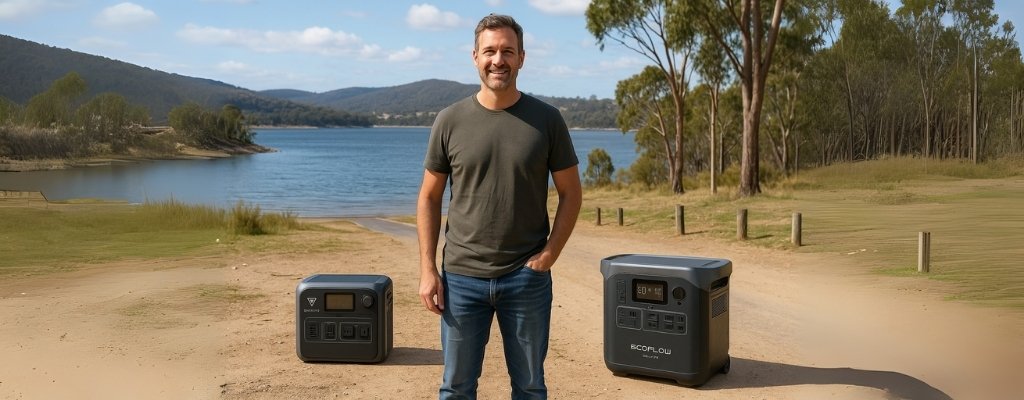
Bluetti AC180 vs Ecoflow Delta 3
Choosing between the Bluetti AC180 and EcoFlow DELTA 3 portable power station? Short answer: the DELTA 3 charges quicker, the AC180 wins on efficiency. But depending on how you use it—weekends away, home backup, or road trips—the answer could change. Let’s dig in and see which one’s the better fit for you.
Not sure which power station is right for you?
Take the quiz!
What’s the Difference in Core Performance and Specifications: Bluetti AC180 vs EcoFlow DELTA 3 Portable Power Station
Key Technical Specifications and Performance of Your Portable Power Generator
Nominal Watt-Hours and LiFePO4 Chemistry
The AC180 packs 1152Wh of capacity. The DELTA 3 edges ahead slightly at 1260Wh.
Both run on LiFePO4 battery chemistry, which is the benchmark for stability, safety, and long-term performance. It’s the sort of battery tech you want if you expect to keep your power station for years, not just seasons.
Cycle Life and Expected Lifespan
With over 3,000 charge cycles before dropping to 80% capacity, either model will outlast plenty of other gear.
In everyday terms, if you’re charging and discharging a few times a week, you’re looking at many years of service before capacity loss even becomes noticeable.
Continuous and Surge AC Output for Diverse Appliances
The AC180 delivers 1800W of continuous output with a surge of up to 2700W.
The DELTA 3 also sits at 1800W continuous, but its surge tops out around 2200W. Both can handle fridges, coffee machines, and power tools, but the DELTA 3’s surge gives a little more breathing room for gear with high start-up spikes.
AC Charging Speed and Technologies
If charging speed matters, the DELTA 3 has the upper hand. It goes from empty to full in roughly 1.8 hours via AC.
The AC180 isn’t far behind at around 2 hours, which is still fast, but when you’re pressed for time—say topping up before heading away—the DELTA’s quicker turnaround could be the clincher.
Solar Input Efficiency and Options for Your Generator
For off-grid setups, both units handle solar well. The AC180 supports up to 500W, while the DELTA 3 can accept around 500–600W depending on panel configuration.
Both make the most of Australia’s sunny conditions, but the DELTA’s solar input can squeeze a little more out of peak daylight.
Other Charging Methods and Port Versatility
Both charge via car outlet, AC, and solar.
The DELTA 3 offers a slightly broader voltage range, giving it better compatibility with different solar panel setups and charging methods when you’re on the move.

Comparing Design, Portability, and Smart Features: Bluetti AC180 vs EcoFlow DELTA 3 Portable Power Stations
Physical Design, Connectivity, and User Experience Features of the Portable Power Generator
Weight, Dimensions, and Ergonomics for Easy Transport
The AC180 comes in at around 18.5–19kg. The DELTA 3 is just a touch heavier at about 20kg.
Both have sturdy handles, making them practical for transport. Neither is a featherweight—think boot space rather than carrying it long distances.
Build Quality and IP Rating for Durability
Both models feel built to last. The AC180 is tough and utilitarian. The DELTA 3 feels more refined, but just as ready for regular use.
Neither unit is rated for heavy rain, so keep them dry in wet weather.
Available AC, USB, and DC Output Ports
The AC180 gives you 3 AC outlets, 4 USB-A ports, 1 USB-C PD, and DC outputs.
The DELTA 3 steps it up with 4 AC outlets, 4 USB-A ports, 2 USB-C PD, and DC ports. More outlets mean more flexibility if you’re running several devices at once.
Wireless Charging Capabilities
The AC180 includes a 15W wireless charging pad on top—handy for topping up a phone without searching for a cable.
The DELTA 3 skips wireless charging but focuses on extra ports instead.
App Control (Wi-Fi vs. Bluetooth) and User Interface
Both link to their companion apps, letting you check battery levels, adjust settings, and control outputs.
The AC180 primarily uses Bluetooth. The DELTA 3 offers Wi-Fi too, which means you can check on it remotely.
UPS Functionality and Transfer Speed
Both work as a UPS, kicking in during outages to keep gear powered.
The DELTA 3 switches a touch faster, which could matter for sensitive devices like desktop computers.

Making Your Decision: Bluetti AC180 vs EcoFlow DELTA 3 - Which Portable Power Station is the Right Fit?
Expandability and Future-Proofing Your Portable Power Generator
Options for Adding External Batteries and Increasing Capacity
Neither model allows for expansion batteries. What you see is the capacity you’ll have, so choose carefully based on your power needs.
Value, Use Cases, and Investment for Your Portable Power Generator
Best Generator for Rugged Adventures and High Power Demands
If you’re heading off-grid for days at a time or running high-demand appliances, the DELTA 3’s faster charge times and extra ports make it a strong choice.
Top Generator for Fast Recharging, Portability, and Smart Home Integration
If efficiency, portability, and simple app control are priorities, the AC180 is a well-balanced option—ideal for camping trips, home backup, and weekend events.
Comparative Pricing, Warranty, and Long-Term Investment
In Australia, the AC180 usually comes in a bit cheaper.
Both include strong warranties (generally 4–5 years) and reliable local support. Over time, both deliver good value for money thanks to their long lifespans and durability.
You might also like:
- Bluetti AC180 vs Elite 200 V2
- Bluetti AC180 vs Anker C1000
- Bluetti AC180 vs Jackery 1000 V2
- Bluetti AC70 vs AC180
- Bluetti Elite 100 V2 vs AC180


